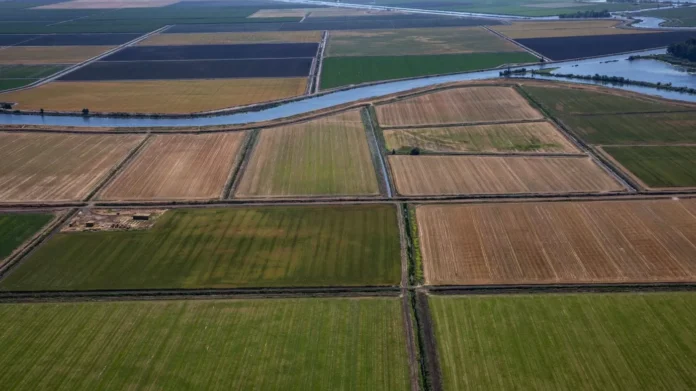Federally funded drought adaptation incentives may not be enough for Colorado River farmers, a new report suggests. The U.S. Department of Agriculture (USDA) has been providing farmers in Arizona, California, Colorado, Nevada, New Mexico, Utah, and Wyoming with $5.6 billion through the Crop Insurance Program for losses caused by drought. However, as the climate continues to change, it is becoming clear that more needs to be done to equip these farmers with the necessary tools to adapt.
According to the report published by the USDA’s Office of Inspector General, the current drought adaptation incentives may not be sufficient to help Colorado River farmers cope with the changing climate. The report raises concerns about the effectiveness of these incentives and the long-term impact they have on farmers’ ability to adapt.
The Colorado River is a vital source of water for over 40 million people and 5.5 million acres of farmland. However, the river has been experiencing severe drought conditions for the past two decades, resulting in reduced water levels and limited resources for farmers. This has significantly impacted the agricultural productivity in the region, and farmers have been left struggling to make ends meet.
In response to this crisis, the USDA has been providing drought adaptation incentives to support farmers in the affected states. These include programs such as crop insurance, conservation programs, and financial assistance for implementing water-saving technologies. While these initiatives have been helpful in the short-term, the report suggests that they may not be enough to address the long-term impacts of climate change on the Colorado River.
One of the main concerns highlighted in the report is the lack of adequate resources and technical assistance for farmers to implement effective drought adaptation strategies. Many farmers in the region are small-scale and do not have the financial means or expertise to invest in new technologies and practices. Without proper support and guidance, it becomes challenging for them to adapt to the changing climate and its impact on their crops.
Moreover, the report also raises questions about the coordination and effectiveness of the existing programs in addressing the issues faced by Colorado River farmers. With multiple agencies involved in providing support, there is a lack of clear communication and collaboration, leading to duplication of efforts and inefficient use of resources. This makes it even more challenging for farmers to access the assistance they need to adapt to the changing conditions.
The USDA has acknowledged the findings of the report and has stated that they will be implementing the recommended improvements to their programs. These include enhancing coordination between agencies, providing more technical support to farmers, and expanding outreach efforts to reach more farmers in need. These actions are a step in the right direction, but more needs to be done to ensure the long-term resilience and sustainability of the agriculture sector in the Colorado River region.
Farmers are the backbone of our nation, and it is essential to equip them with the necessary tools and resources to adapt to the changing climate. The current drought adaptation incentives may have helped in the short-term, but as the report suggests, they fall short in addressing the long-term impacts of climate change. It is time for the government to take bold steps towards providing comprehensive and effective support to farmers in the Colorado River region.
However, the responsibility of tackling the effects of climate change does not solely fall on the government. Farmers also need to take proactive measures to adapt to the changing conditions. This could include implementing sustainable farming practices, such as crop rotation and conservation tillage, which can help conserve water and improve soil health. There is also a need for continued research and innovation to develop new technologies that can assist farmers in adapting to the changing climate.
In conclusion, the report’s findings are a wake-up call for all stakeholders involved in managing the Colorado River and supporting its farmers. It is clear that more needs to be done to ensure the long-term sustainability of agriculture in the region. The USDA must continue to work with farmers and other agencies to implement effective and coordinated strategies that equip farmers with the tools they need to adapt to the changing climate. Let us all come together and take action to secure the future of the Colorado River and its farmers.

